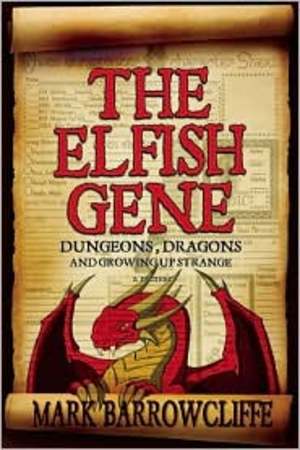

Everything about Mark Barrowcliffe’s The Elfish Gene: Dungeons, Dragons and Growing Up Strange screams of its geek credibility. The cover of the book features a yellowed D&D character sheet and a red dragon. Its website has a fantasy character generator. Wizards of the Coast are even working to promote the book.
The book seems a perfect fit for gamer geekdads who want to take a quick jaunt back in time to the early days of D&D. For those excited about sharing their old hobbies with their children, the book could serve as a primer for all that is fun and beneficial of the hobby. From the website’s synopsis:
"In the summer 1976, twelve-year-old Mark Barrowcliffe had a chance to be normal. He blew it. While other teenagers were being coolly rebellious, Mark—and 20 million other boys in the 1970s and 80s—chose to spend his entire adolescence pretending to be a wizard or a warrior, an evil priest or a dwarf. He had discovered Dungeons & Dragons, and his life would never be the same. No longer would he have to settle for being Mark Barrowcliffe, an ordinary awkward teenager from working-class Coventry, England; he could be Alf the Elf, Foghat the Gnome, or Effilc Worrab, an elven warrior with the head of a mule."
As an adult whose childhood was shaped in no small part by tabletop roleplaying games, I had little doubt that this was a book that would speak to me. It did, but not quite the way I expected. If you’re looking for a book that endlessly touts the joy and fun of games like Dungeons and Dragons, Elfish Gene is not it.


Instead, Barrowcliffe spends nearly 300 pages looking back on his childhood with disappointment and embarrassment. The book is well-written and the author includes some pretty funny anecdotes. I laughed out loud when Barrowcliffe described his attempts to leap into a laundry basket to display his nascent ninja prowess, and all of his childhood friends were uncannily familiar in their strange and humorous mannerisms. I knew these guys.
Still, as an adult who was at one time an "ordinary awkward teenager" drawn into the escape of wargames and D&D, I found myself waiting for a moment where Barrowcliffe would come out and say, "Yes, getting picked on by bullies was horrible, and spending time with boys who were unwilling to bathe was difficult to stomach, but I had a truly wonderful time. I’m glad I played Dungeons and Dragons." It never came. Barrowcliffe’s obsession—and from his description, it might be better defined as addiction—and his post-childhood reaction to it overshadow the joys that he might once have experienced at the gaming table.
The memoir is bookended by Barrowcliffe’s less-than-positive judgment on gaming. He opens the book with a dedication: "Avoid this." It’s unclear if he’s referring to roleplaying games in general, or his own clingy obsession to then. Then, the book begins:
"An elf cloak is designed to render its user invisible.
Worn in the Coventry shopping precinct when the City soccer team is playing at home, however, it has rather the opposite effect.
What follows explains why, on 24 October 1981, I was thrown into a fountain by soccer hooligans and how I eventually came to wish they’d done it years earlier."
That very first passage sums up the main problem I have with the book. Barrowcliffe’s exceptional wit collides with his intense regret and the result can be a bit of a downer. The first two paragraphs of the book are hilarious, but there’s something about the third that seems more sad than funny.
Don’t get me wrong. I enjoyed reading the book quite a bit. It transported me back in time to basements and bonus rooms, rolling dice and staying up until all hours of the night fighting imaginary monsters. Barrowcliffe skillfully portrays his cast of boyhood mates and the dramas of their hobby: gaming stores closing too early, arguments over esoteric game rules, and encroaching hormones. I loved this part of the book.
There is a vicious undercurrent of frustration to Barrowcliffe’s stories, though. He openly acknowledges that he wasted his time with games and within the pages of his book he never reveals to the reader that it was in any way worthwhile. Perhaps Barrowcliffe is not writing for gamers but is instead trying to appeal to a wider audience, thus the unending self-deprecation. Parts of the book seemed less a memoir about the author’s experiences with the hobby and more a condemnation of gaming culture.
At the end, an adult Barrowcliffe seeks out a gaming group to see how D&D had changed over the years. He finds a group full of "the sneaks, the silent, the megalomaniacs and the plain weird," and concludes that the motley crew of misfits "may have had something to do with the fact that [he] had to seek out an adult gaming group." It may seem overly sensitive, but I took offense at that. Barrowcliffe claims that "if you’re still playing into your twenties and beyond then you’re an addict." I don’t know what to make of that. It’s either the author’s honest opinion of adult gamers, or it’s an attempt at humor. Either way, it failed to engage. In the end, Barrowcliffe feigns illness in order to leave the gaming table. He runs away, literally, from the games and the culture, "away from the lands of fantasy and towards reality".
Here’s the thing, though: I read this book, cover to cover, in a matter of hours. I couldn’t put it down. Barrowcliffe’s voice is honest, brutally so, and he seems to have a true memoirists’s eidetic memory. Like Nick Hornby in Fever Pitch or the fictional High Fidelity, Barrowcliffe encapsulates the draw of escapism and the raw power of obsession over the drab canvas of reality. While I can’t agree with him that roleplaying games should be avoided, I respect his decision that, for him, they were a distraction that proved far too addictive.
If you’re looking for a fluffy memoir with humorous D&D-related anecdotes and a happy ending complete with endorsement of the hobby—what the book seems to be marketed as—then you may be disappointed. But if you keep reading, you’ll find something else, something with a bit more depth, that has all the funny stories, but throws some realism into the mix. Escapism is addictive, regardless of its form, and it can bring out the worst in people if they’re not prepared to take it in moderation.
Buy The Elfish Gene: Dungeons, Dragons and Growing Up Strange from Amazon
![Reblog this post [with Zemanta]](http://img.zemanta.com/reblog_e.png?x-id=29e02d87-61db-4b3c-a74d-79620113976b)


